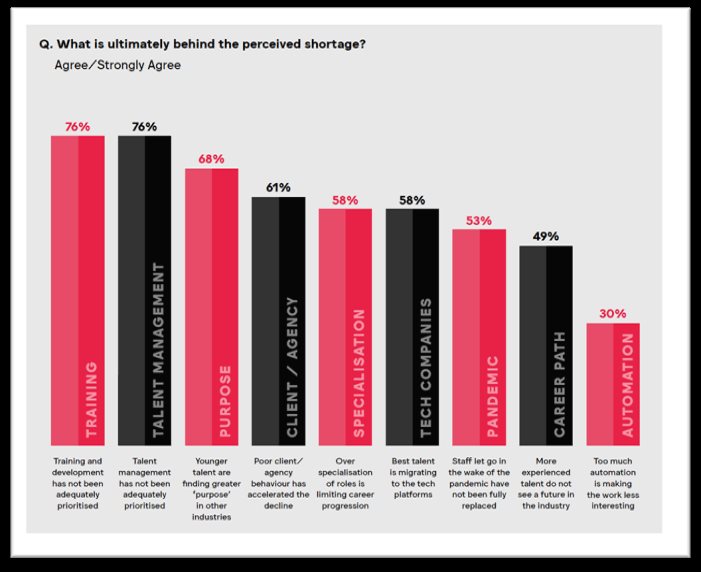The last few years have been grueling in the advertising sector. Faster turnarounds, more channels, lower fees, less patience, less face-to-face, more loneliness, longer hours, more planning yet less creativity. More for less. Consequently, lower quality, more compromises, less heart.
Mental health out of the shadows
Luckily, one of the better outcomes of the Covid crisis, was that mental health came out of the shadows. People realised that their colleagues or suppliers were taking strain, and they stopped to ask.
Programmes were initiated to help people get help. Mental health check-ins took place before Teams calls started. Online initiatives to monitor the happiness and health of teams were developed and implemented to build resilience and "employee well-being strategy". People who were struggling were given the attention and resources they needed to cope and remain productive.
Handle with care
Accenture Song's Fjord Trends has identified "Handle With Care" as one of its five major trends. "Care has moved centre stage" he says.
"We have seen the rising importance of self-care. The pandemic has wreaked havoc on mental health around the world. The amount of time and attention now devoted to caring for the well-being of colleagues has likely increased.
“Compassion and grace in the face of a colleague's struggles—such as mental health issues, grief, or a sudden disruption through illness—have become normalised. The responsibilities around self-care and caring for others will likely continue to be a priority. For brands, visibly caring for customers builds trust,” says Fjord.
Technology became both a new channel and a source of solutions to care, to administer, treat, and connect mental well-being. Apps and websites communities like Calm, 7Cups and others evolved from individual offerings to providing management support for employee health and happiness.
Mindfulness became normalised, as did speaking about personal issues and letting your kids sit in on meetings. Hopefully, the crisis mindset that forced these changes, and forced leaders to listen and empathise, will continue.
Worst ever talent crisis
Why is this important? It's important because the advertising industry is filled to the brim with knowledge workers.
They are self-driven, motivated, and energetic. They search for newness and love a challenge.
What they don't love though is more speed and less time to think and craft. They also don't love the tension emanating from clients being under pressure, under-resourced, and under-skilled in key decision-making areas that affect the process and quality of output.
The combination of the relentless turning of the wheel, at pace and scale, and lower mental fitness, is potentially disastrous on two levels.
One, the industry on a global scale is finding it harder and harder to attract talent.
A recent WFA report on the "worst ever talent crisis" found 85% of agencies recognise the scarcity of talent as a problem, with 38% rating it very highly. 67% highlight how scarcity is a major blocker towards growth, identifying talent as the key commodity driving the industry.
Why is it hard to attract and retain talent? Abusive client relationships are as little fun as they sound. Why put yourself through it?
The hours are always-on and the pay and benefits aren't as good as the tech companies. The ability to have autonomy, mastery, and purpose (factors of motivation according to Daniel Pink's book Drive) is slim.
The WFA's research confirms a negative client-agency relationship dynamic is a major turnoff for attracting or retaining talent in agencies, particularly where there is an imbalance in trust, transparency, and remuneration.
Much of the research points to the need for better training and alignment of expectations to reset the way that talent is supported and rewarded. "Education and alignment on the client side are essential. The service gap is always a result of expectation misalignment."

What is ultimately behind the perceived shortage? Agree/Strongly Agree
The second problem with an uncaring and un-nurturing way of working is with the "creative tap"; that should be open, with the best people wanting to work on your briefs, with inspiration and energy flowing your way, is slowly but surely being closed until clients get what they want, and no more.
More heart is needed
Why is that a problem? Because what they want isn't nearly as good as what they need.
The process is not only made harder with poor briefs and bad evaluation skills, it inevitably takes longer, costs more, and generates lower-quality output. The creative tap doesn't magically re-open on the next brief either.
So, the industry needs more heart in the process. More nurturing of people, not deadlines and timesheets. Less volume, more thoughtful brand building, more growth unlocking work. This comes from more time to think, more allowing talent to do its thing.
Brands too are realising that maybe they need more heart. The Fjord trend report suggests that brands show they’re more caring, empathetic side.
Unless brand managers have been living under a rock, they will have read the tomes of published work about the effectiveness of emotional messaging, in research published by the IPA, the WAF, WARC, and research companies like Kantar and System1.
In the Long and the Short of It, by Peter Field and Les Binet, they found that emotional campaigns build brands more strongly regardless of the measure: awareness, commitment, trust, differentiation, fame, or image. Emotional campaigns are far more powerful at building brands. They create emotional bonds and associations.
Source: https://www.westwoodone.com/blog/2018/06/25/rational-versus-emotional-creative-short-term-and-long-term-impact/
Short-termism functional messaging serves its purpose, but more and more research shows that the abandonment of brand-building activities in favour of short-term activities, is long-term damaging.
Brands need careful and consistent input into building memories, refreshing perceptions, solidifying distinctiveness, and emotion works. For the heart to come back into the creative output, the creative teams need to work with heart. And for them to do so, their clients need to do so too.
Employee experience
As part of the Fjord trend around care, their last suggestion is for employers to take a detailed look at the employee experience.
"Designing internal processes and rules to reduce employees' mental load is a subtle, yet important way to show care. In all aspects of work, employers can declutter and make cumbersome experiences invisible and easy and give people space to do the work they're meant to do."
This advice is appropriate and necessary both for marketing teams and agencies.
The nurturing of talent and the unlocking of innovation must be the result of this slow but steady mental health discussion. But it's not just about getting an app and doing meditation at lunchtime, it's about a radical rethink of the way the teams work together to make better quality work that is proven to work better.









































